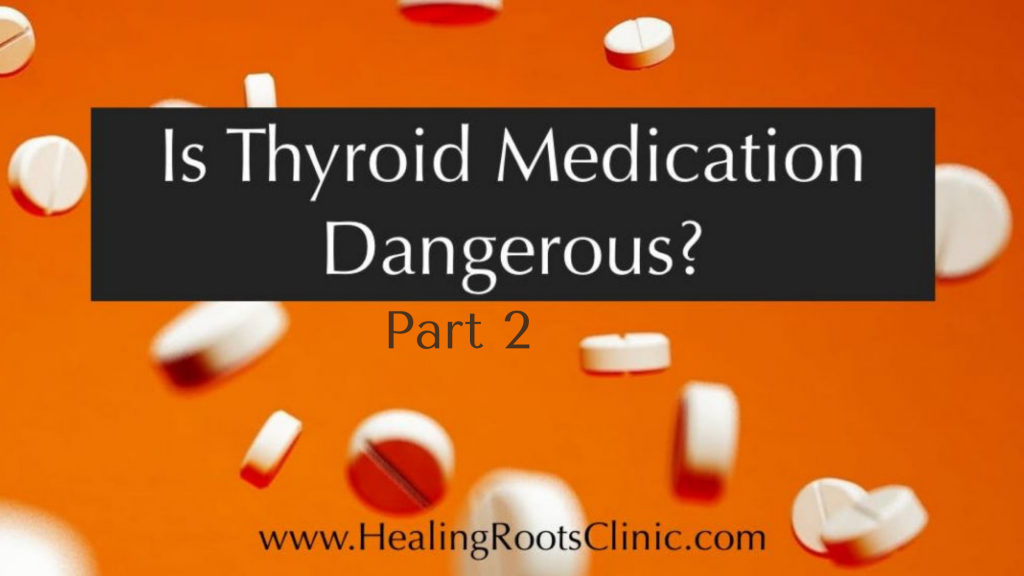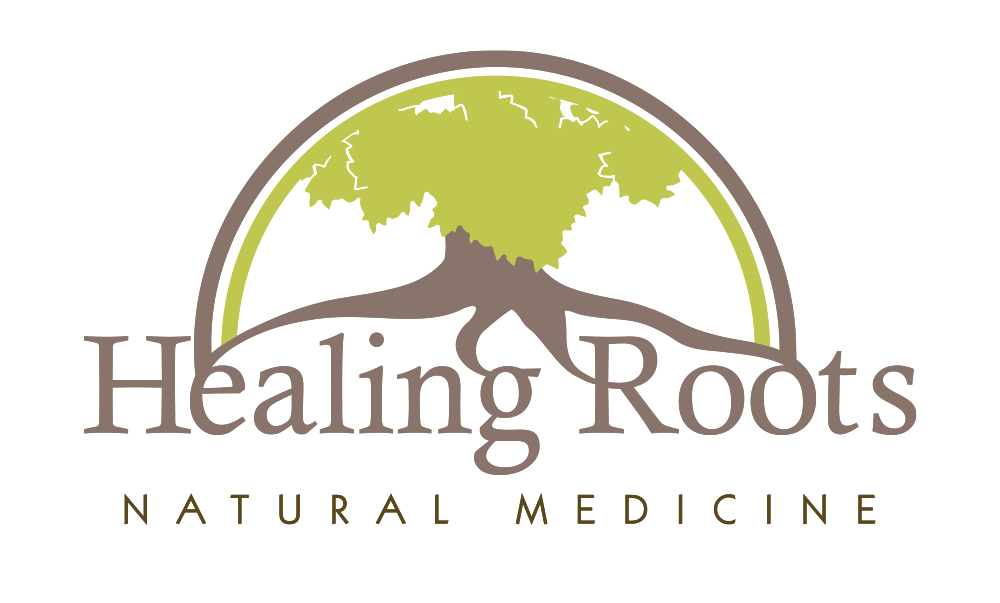
In my previous blog post, I began to address the question: Is Thyroid Medication Dangerous? In that post, I agreed with conventional medicine that thyroid medication is not toxic and the drug itself doesn’t usually cause side effects (although it can), I suggested perhaps we should be asking different questions about thyroid medication, including:
- Does this drug or intervention address the root cause(s) of the issue?
- If I choose this route, will the underlying issues be ignored or covered up?
- What are the repercussions of not treating the underlying cause and how will this impact my health in the long run?
- Could there be additional benefits of choosing another or concurrent approach to treatment?
One way to approach these questions is to consider diseases that often develop alongside thyroid disease; there are many well documented examples of this in the case of autoimmune thyroid conditions. Another way to approach these questions is to look at the factors thought to contribute to the development of thyroid diseases and some of the non-thyroid conditions that often are also associated.
Autoimmune Thyroid Diseases And Other Associated Autoimmune Diseases:
I often explain to patients that once a person develops one autoimmune disease, they are far more likely to develop additional autoimmune conditions if they don’t heal their immune system and address the underlying causes of the first autoimmune disease. The following is a list of other autoimmune diseases that have been diagnosed in people with Grave’s and Hashimoto’s:

Whew! That is a long list of diseases that I don’t want and you probably don’t either. Now, let me be clear – taking thyroid medication does not cause these associated diseases. BUT, taking thyroid hormone is very likely to create a mask for the real problems in both Grave’s and Hashimoto’s. While thyroid hormone medication will help make TSH levels look normal in a blood panel, it doesn’t address or heal your immune system. The immune system will most often continue to be out of balance (despite medication and normal TSH blood levels) if medication is the only treatment approach. The medication isn’t really curing or healing anything, leaving you open to additional associated autoimmune conditions. From my perspective, if a medication allows us (or our health care providers) to put our heads in the sand while other potentially very serious diseases develop, there is a dangerous aspect to it.
But what about non-autoimmune thyroid disease?
Let’s take a minute to examine the factors that contribute to the development of thyroid diseases and their systemic impact that are not from an autoimmune disease. If thyroid hormone is merely replaced but the underlying cause isn’t addressed, there are still potential problems where additional conditions could arise. There are fewer clear cut examples here, but I believe the lack of examples is more likely because the studies have not been done, not because the correlation doesn’t exist.
Let’s consider some of the factors associated with the development of all kinds of thyroid conditions, including Hashimoto’s and Graves, but also non-autoimmune hypothyroid. These factors include, but are not limited to HPA axis dysfunction (aka adrenal fatigue), leaky gut, a disrupted gut microbiome, and nutrient deficiencies.
HPA Axis and Thyroid
HPA Axis refers to the relationship and communication among the hypothalamus, pituitary and adrenal glands. The HPA Axis can be thought of, in a simplified way, as our stress response. When this response is out of balance, we can have trouble managing stress, energy levels, and blood sugar. We can end up with chronic inflammation, struggle to get restorative sleep and experience other hormone imbalances, including sex hormones and thyroid. HPA Axis Dysfunction is often referred to simply as adrenal fatigue.
The HPA Axis is part of the endocrine system, just like the thyroid. You may recall from previous blog posts (Thyroid part 2 and Thyroid part 3), that the hypothalamus and pituitary glands monitor conditions in your body and signal the thyroid to release more or less thyroid hormone based on your body’s need at any given time. We sometimes refer to the HPATG Axis (the Hypothalamus, Pituitary, Adrenal, Thyroid, Gonadal Axis) to describe the relationship of all the different aspects of your endocrine system. As a whole system, it makes sense that the health of one aspect of it will impact the health of another. If one member of the system is struggling, the rest will be impacted.
HPA Axis dysfunction is common in many types of thyroid disease and must often be addressed in order to balance and heal the thyroid. Chronic fatigue (10), insomnia (11), and type 2 diabetes (12) are just a few of the diseases associated with HPA Axis dysfunction. If HPA Axis is a key component of your thyroid disease (as it is for many) and you take thyroid hormone without addressing the HPA Axis dysfunction, you may be at risk for developing insomnia, type 2 DM, chronic fatigue or other issues associated with poor inflammation control and stress.
Leaky Gut and Thyroid
I’ve written several articles about leaky gut (Basics, 9 Causes, Prevention, Heal) and its connection to autoimmune diseases, including thyroid. Here are some of the conditions I listed previously as associated with leaky gut:
- Non-Alcoholic Hepatosteatosis (NASH)
- Parkinson’s disease
- Obesity
- Autoimmune disease
- Irritable Bowel Disease (IBD) – including Colitis, Crohn’s disease
- Hashimoto’s
- Graves’ disease
- Scleroderma
- Rheumatoid Arthritis
- Ankylosing Spondylitis
- Multiple Sclerosis
- Type 1 diabetes
- Irritable Bowel Syndrome (IBS)
- Atopic dermatitis
- Allergies
- Asthma
If leaky gut is part of why you developed a thyroid condition, and your gut isn’t directly addressed and repaired, you will be at risk for developing some of the other conditions listed despite a normal TSH blood level.
Gut Microbiome and Thyroid
A disrupted gut microbiome, or dysbiosis, is common in those with Thyroid disease. Dysbiosis can refer to a deficiency of beneficial bacteria in the gut, an overgrowth of the good bacteria to the point that it acts a bit like an infection, or the presence of a microbe (bacteria, fungi or parasite) that doesn’t belong in your gut at all. Rheumatoid arthritis, poor sleep, chronic kidney disease, obesity, IBD, some liver disease (including NASH), and diabetes have all been associated with a disrupted gut microbiome (13). And from my own experience, I’ll add elevated cholesterol, acne and PMS, just to name a few. If dysbiosis is part of why you developed thyroid disease in the first place, and it isn’t addressed, even if your TSH is totally controlled with thyroid hormone replacement, you might find yourself with one of these other conditions or symptoms.
Nutrient Deficiencies and Thyroid:

Let’s take a look at three common nutrient deficiencies that are common issues in those with thyroid disease and for an optimally healthy body.
Selenium
Why Selenium is important for thyroid:
- Needed to convert T4 to T3, active form of thyroid hormone (14).
- Essential part of glutathione peroxidase, which protects the thyroid and other tissues from oxidative damage and toxins.
Other reasons why it is important:
- Deficiency may impact stress response
- Removal of toxic heavy metals from the body (15)
- Deficiencies can impact immunity and inflammatory response (16).
Other Disease associated with a deficiency:
- Keshan cardiomyopathy and Kashin-Beck osteoarthropathy (mostly found in frankly deficient areas in Asia)
- May exacerbate CIRS (critical illness stress-induced immune suppression), which can make individuals more susceptible to nosocomial infections and sepsis.
- Influenza (in animal studies)
- Irritable bowel disease (studies show mixed results on this association)
- Asthma
- Rheumatoid Arthritis
- Perhaps: other diseases associated with heavy metal toxicity (for example, Alzheimer’s and other neurodegenerative conditions – (17) and the many conditions associated with altered stress response.
Zinc
Why Selenium is important for thyroid:
- Conversion of T4 to T3 (14; 15).
- Part of the cell receptor sites for T3 (important for helping thyroid hormone get into your cells) (19).
- Necessary for the hypothalamus to signal the thyroid to produce more hormones (20).
Other reasons why it is important:
- Cell metabolism-Communication between cells.
- Need for 300 different enzymes found in your body.
- Important part of cell membranes and proteins.
Other Disease associated with a deficiency:
- Impaired growth and development in children
- Pregnancy complications immune dysfunction
- Increased susceptibility to infections
- Alopecia (hair loss) (21, 22)
- Delayed wound healing; poor sense of taste and smell (23).
Iodine
Why Selenium is important for thyroid:
- Key component of the actual thyroid hormone (T3 and T4, have 3 and 4 iodine molecules attached, respectively).
Other reasons why it is important:
- The mammary glands (breast tissue), eye, gastric mucosa, cervix and salivary glands all contain iodine. How iodine is used by these tissues, with the exception of breast tissues, is unclear. It appears to have antioxidant function.
Other Disease associated with a deficiency:
- Fibrocystic breasts (24)
- Iodine Deficiency Disorder (IDD) (the most preventable cause of mental retardation) (25)
Get at the Roots and Use All Available Tools for Better Outcomes:
You can see from this chart that some of the nutrient deficiencies that can lead to poor thyroid function can also contribute to a variety of other issues including poor immune function, Irritable Bowel Disease, fibrocystic breasts, hair loss, pregnancy complications, and loss of smell and taste. Taking thyroid medication does not provide your body with any of these nutrients.
There are so many conditions and symptoms that are associated with the same underlying patterns, deficiencies and triggers as thyroid disease! Supplemental or prescription thyroid hormone won’t and can’t correct your leaky gut, improve the balance of bacteria in your gut, replace deficient nutrients, or make the HPA Axis work harmoniously. BUT, addressing these factors can absolutely help to heal your thyroid and reduce symptoms. Addressing these factors will also go a long way in improving your overall health and preventing other future diseases – this is always my goal as a naturopathic doctor. I want my patients to have side BENEFITS rather than side EFFECTS when they work with me.
It is important to be totally clear about two things.
Number one, the connections presented between thyroid disease and the associated diseases should be further studied. I am simply suggesting some possible associations between thyroid disease and other conditions based on the literature that is available. It is also my personal experience in treating many patients, that virtually everyone benefits from going beyond thyroid medication to address underlying causes of thyroid disease.
Number two, I am not suggesting that thyroid medication has no benefit and therefore shouldn’t be used at all. There are patients whom I refer out for pharmaceutical support for their thyroid to accompany the work that we are doing to heal their body. Thyroid hormone replacement sometimes gives just the right relief for a patient to have the energy resources they need to be successful with following one of my treatment plans, which are often quite involved. There are also individuals with long standing thyroid disease that need thyroid hormone replacement because of destruction to the thyroid gland over time.
In the end, I recommend that you address the underlying cause, by using whatever tools you need, including hormone replacement, when necessary, to help you get there.
Additional References:
- Lapcević M. Autoimmune thyroid disease and associated diseases. Srp Arh Celok Lek. 2005 Oct;133 Suppl 1:84-7. Serbian. doi: 10.2298/sarh05s1084l. PMID: 16405263. (26)
- Lazúrová I, Benhatchi K, Rovenský J, Kozáková D, Wagnerová H, Tajtáková M, Shoenfeld Y, Macejova Z. Autoimmune thyroid disease and autoimmune rheumatic disorders: a two-sided analysis. Ann N Y Acad Sci. 2009 Sep;1173:211-6. doi: 10.1111/j.1749-6632.2009.04809.x. PMID: 19758153. (27).
- Tektonidou, M. G., Anapliotou, M., Vlachoyiannopoulos, P., & Moutsopoulos, H. M. (2004). Presence of systemic autoimmune disorders in patients with autoimmune thyroid diseases. Annals of the rheumatic diseases, 63(9), 1159–1161. https://doi.org/10.1136/ard.2004.022624 (28).
- A. T. Y. Chan, Z. Al‐Saffar, R. C. Bucknall, Thyroid disease in systemic lupus erythematosus and rheumatoid arthritis, Rheumatology, Volume 40, Issue 3, March 2001, Pages 353–354, https://doi.org/10.1093/rheumatology/40.3.353 (29)
- Hanan El-saadany, Manal Abd Elkhalik, Timour Moustafa, Enam Abd El bar. Thyroid dysfunction in systemic lupus erythematosus and rheumatoid arthritis: Its impact as a cardiovascular risk factor. The Egyptian Rheumatologist, Volume 36, Issue 2, Feb 2014, Pages 71-78. (30)
- Wu, P. Thyroid Disease and Diabetes. Clinical Diabetes, Volume 18, Issue 1, Winter 2000, Pages 38-39. (31)
